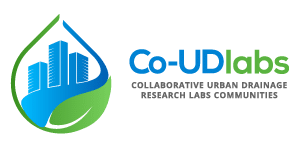A combination of interconnected Joint Research Activities will allow to improve the understanding of asset deterioration and secure the long-term resilience and sustainability of urban drainage systems with the help of more robust, autonomous and interconnected smart monitoring techniques and digital water data analysis tools:
- Co-UDlabs provides new services to projects users and to the UDS community, such as a catalogue of new technologies, validated methods for system monitoring, and open-source tools for reliable and robust data acquisition.
- Co-UDlabs contributes to network renewal, renovation and repair options intelligently selected to ensure sustainable, high-level performance regarding sanitation and flood safety.
- Co-UDlabs allows the development of standardized methods to measure the hydraulic and water quality performance of UD technologies, to quantify their resilience and recovery, and to improve their long-term sustainability.
WP6 JRA1
Smart sensing and monitoring in urban drainage
- To foster a paradigm shift in UDS management, transitioning from current inefficient approaches towards a digitized, informed, shared, evidence-based decision process based on truly smart monitoring.
- To identify and evaluate new sensors and technologies for hydrological and hydraulic variables, pollutant load monitoring and UD underground asset inspection.
- To define and evaluate new methods and tools to improve evidence base for reliable and validated urban drainage monitoring data.
- To define and evaluate new methods to analyze and interpret urban drainage space and distributed data.
WP7 JRA2
Evaluation of assets deterioration in urban drainage systems
- To evaluate current national in-pipe defect identification protocols by examining uncertainty associated with defect identification and characterization.
- To understand how knowledge on individual pipe defects can be used to estimate pipe condition that can then be mapped onto system performance.
- To propose new common frameworks that use reliable knowledge of pipe condition to make robust decisions on renewal, renovation and repair.
- To identify technology development needs for in-pipe inspection and defect deterioration process that can lead to more robust renewal, rehabilitation and repair actions at a European level.
WP8 JRA3
Improving resilience and sustainability in urban drainage solutions
- To develop consensus on methodologies needed to provide high resolution data to assess the performance of urban drainage technologies.
- To demonstrate how the urban flood resilience and pollution transport/retention properties of urban drainage technologies can be evaluated.
- To demonstrate and propose a methodology for the evaluation of the sustainability of new and emerging urban drainage technologies.
